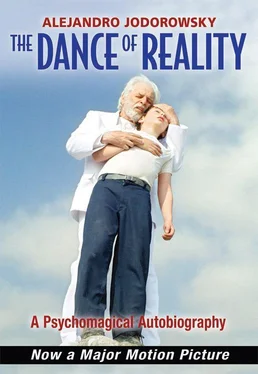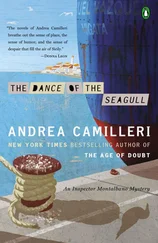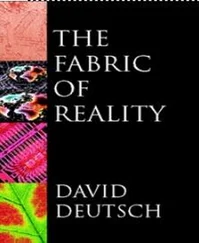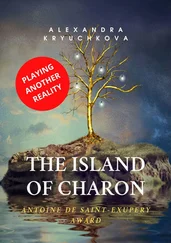On another occasion I went to a French restaurant accompanied by four very well-dressed poets. We all ordered steaks with pepper. When the steaks arrived, we rubbed them all over our clothes, soaking ourselves in sauce. Once this was accomplished, we ordered the same thing again, and repeated the act. And so on, six times over, until everyone in the restaurant was trembling, seized by a kind of panic. Then each of us, pulling a rope from his pocket, made a six-steak necklace. We paid and left quietly, as if what we had done was the most natural thing in the world. One year later, when we returned to the same establishment, the headwaiter told us, “If you’re planning to do what you did the other day, we can’t let you in.” The event had made such an impression on him that, despite its having been quite long ago, it seemed to him as if he had seen us last week. Another time we decided to announce the arrival of a Sufi sage, whom we named Assis Namur. We distributed leaflets that read, “Tomorrow at 5:00 p.m., at the feet of the Virgin of San Cristobal Hill, the holy Assis Namur-the-poor, after a supreme effort, will achieve indifference.” We took the cable car up the hill and sat at the feet of the enormous statue of the Virgin. Lihn, wrapped in a sheet and in a meditative pose, used an eyebrow pencil to write a bold “No!” on his forehead. We waited for hours. No one showed up. However, the next day there was a brief article in the evening paper, the Diario de la Tarde, reporting that the famous sheik Assis Namur had visited Santiago de Chile.
Our intention was to demonstrate the unpredictable quality of reality with these poetic acts. Lihn and I pulled ground meat out of our pockets at a meeting of the Literary Academy, flinging it at the worthy attendees while giving cries of horror. This caused a collective panic. For us, poetry was a convulsion, an earthquake. Appearances were to be denounced, falsehoods unmasked, and conventions challenged. Dressed as beggars, we took up a violin and a guitar in front of the patio of a café, as if we were about to play. Then we broke the musical instruments by smashing them against the sidewalk. We gave a coin to each patron and left. At a lecture by a professor of literature in the central hall of the University of Chile, while dressed as explorers we approached the speaker’s table crawling on all fours and with melodramatic moans of thirst fought with each other to drink the water from the official carafe. We lined up to enter a movie theater disguised as blind people and crying loudly. In an act paying homage to mothers, on the tenth of May we dressed in tuxedos and sang a lullaby while pouring several bottles of milk over our heads.
However, our youthful enthusiasm also led us to commit some grave errors. We went to the medical school and, with the complicity of friends who were students there, stole the arms of a corpse. Lihn took one arm and I the other, and we each dressed in an overcoat. Then we went around shaking hands with people, giving them the dead hands. No one dared to comment that our hands were stiff and cold because they did not want to face the reality of those dead limbs. Once finished with this macabre game we threw the arms into the Mapocho River without thinking of the consequences and without paying any respects to the human being who had possessed them.
Our feeling of freedom led us to do evil. On the banks of the Mapocho, a wild area in those days, a colony of ants had built a statuesque city. Enrique and I invited a group of artists to this location, promising an “exemplary comedy.” We set folding chairs around the ant mound. We dressed as soldiers. We advanced, goose-stepping in our boots, saluting like Nazis, and trampled the ant nest, carrying out a massacre of thousands of insects. Driven mad, they spread out in a black swarm beneath the feet of the spectators, who, disgusted, began to stomp on them. Although everyone certainly understood the meaning of our message, this did not make us any less cruel murderers of ants. We felt affected by this experience, and it led us to question ourselves seriously.
What is the definition of a poetic act? It should be beautiful, imbued with a dreamlike quality, should be above any justification, and should create another reality within the very heart of ordinary reality. It should allow for transcendence to another plane. It should open the door to a new dimension, achieving a purifying courage. Therefore, if we were proposing to perform an act deviating from ordinary and codified behaviors, it was necessary for us to evaluate the consequences beforehand. The act should be a vital fissure in the petrified order perpetuated by society, not a compulsive manifestation of blind rebellion. It was essential to distrust the negative energies that could lead to a senseless act. We understood why André Breton had apologized after yielding to excitement and declaring that the ultimate surrealist act was to go out into the street brandishing a revolver and killing random strangers. The poetic act should be a gratuitous act that allows creative energies that are normally repressed or latent in us to manifest with goodness and beauty. The irrational act is an open door to vandalism and violence. When a crowd is enraged, when manifestations degenerate and people set fire to cars and break windows, this is also a release of pent-up energies. But it does not deserve to be called a poetic act.
A Japanese haiku gives us a clue. The student shows the teacher his poem:
“Here’s a butterfly:
Now I will tear off its wings.
I get a pepper!”
The teacher’s response is immediate.
“No, that’s not it. Listen:
“I have a pepper:
Now I add some wings to it.
Here’s a butterfly!”
The lesson was clear: the poetic act must always be positive, aiming for construction and not destruction.
We reviewed the acts that we had carried out. Many of them had been nothing more than hateful reactions against a society that we considered vulgar, more or less clumsy attempts at an act worthy of being called poetic. We clearly saw that on the day we had gone into my father’s shop accompanied by Assis Namur, claiming that Jaime was a holy man because he was selling a beautiful void then opening a box to show that it was empty, we should have arrived in a procession with a bag of socks and filled the box with them in order to realize his dream of becoming a merchant. Instead of putting earthworms between the legs of my parents, I should have filled their bed with chocolate coins. Instead of staring in the dark like a beast at the crotch of my sleeping sister, I should have used immense delicacy to place a pearl between those labia. Instead of cutting off the dead man’s arms, we should have painted him gold, dressed him in a purple robe, put long hair and a beard on him, and added a crown of electric lights, making him into Christ. We should have put a plaster Virgin smeared with honey next to the ant mound, so that the ants would cover her, giving her a living skin.
After this gaining of awareness, we had no more regrets. Errors are excusable if they are committed only once, in a sincere quest for knowledge. These atrocities had opened up our path to the true poetic act. We decided to create an act for the consecrated Pablo Neruda. It was known that he would return from Europe the following spring on a very precise date. We knew a gentleman whose passion was to cultivate butterflies. He had a thorough knowledge of the habits of these insects, and he knew how to breed their larvae. We made him an accomplice in our act and went to Isla Negra with him to a beach where the poet had built a retreat by joining together several houses with a tower rising from their midst. Lihn, with the air of a magician, inserted an antique key — apparently a memento from his grandmother — into the old lock, and without applying the least force, unlocked it. The door to the sacred lair swung open! Although we knew that no one was living there, we walked on tiptoe, afraid of awakening some unknown and terrible muse. The rooms were full of beautiful and strange objects: collections of bottles of all types, figureheads with faces flushed by delusions, bizarrely shaped rocks, huge seashells, old books, crystal balls, primitive drums, coffee mills, all sorts of spurs, folk dolls, automata, and so forth. It was an enchanting museum formed by the child that inhabited the soul of the poet. Out of religious respect, we touched nothing. We moved as little as possible, gliding rather than walking to dodge the artifacts. The butterfly breeder, carrying his packets, stood stiff as a statue, hardly daring to breathe. All at once, Enrique was seized by an angelic energy that made him suddenly lighter on his feet. He began to jump effortlessly, intoning a song composed of unintelligible words, sounding like something between Arabic and Sanskrit. We saw him dance as if his body had lost its bones; his balance was amazing, his movements more and more daring, closer and closer to the precious objects. When he reached a final paroxysm, he shook so fast that he appeared to have hundreds of limbs. He did not break anything. All items remained in place. After the dance, we knelt meditating while the butterfly breeder placed his caterpillars in strategic corners. After the task was completed, we started back toward Santiago. The cultivator assured us that when Neruda returned to his house, clouds of butterflies would emerge from every corner.
Читать дальше












